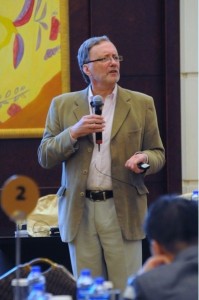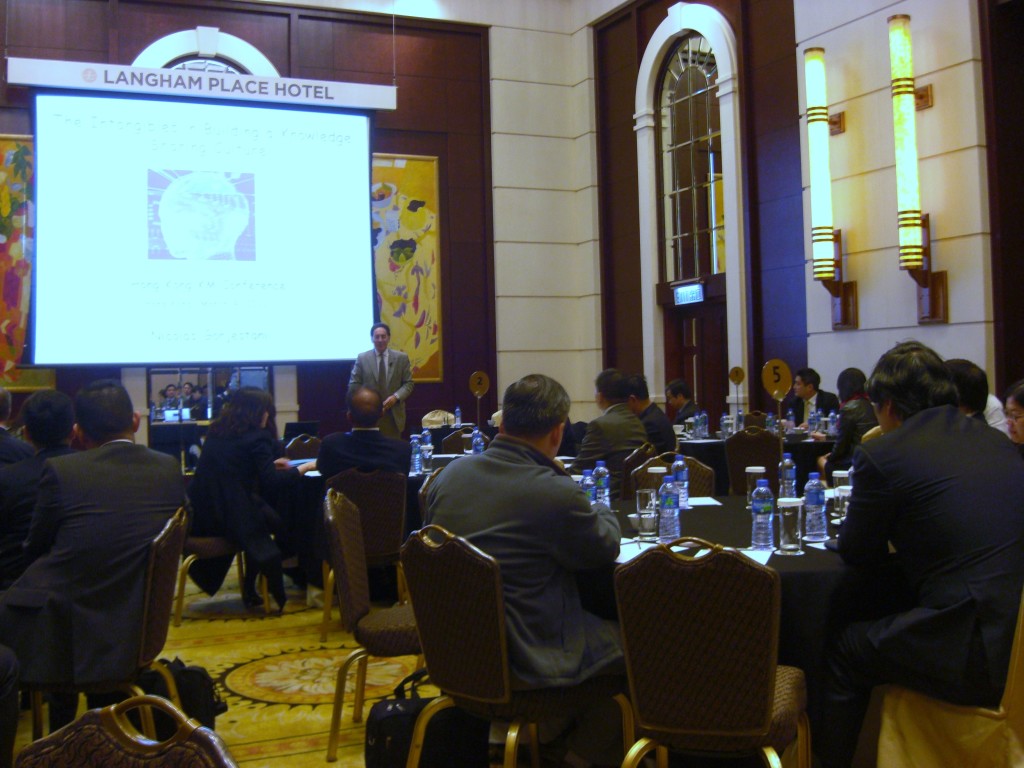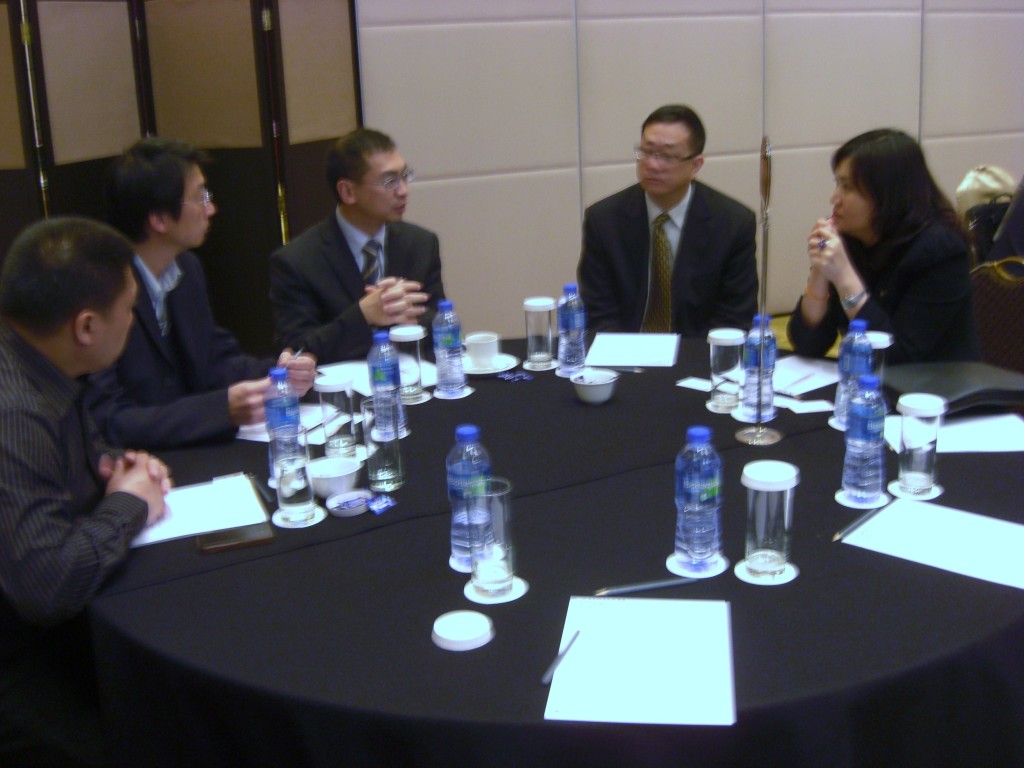In 2011, I participated in the Hong Kong Knowledge Management Society’s annual conference at the Langham Place Hotel in Mongkok, Hong Kong.
Interestingly, they asked me to help them turn the conference into a Knowledge Café.
You may not consider turning a 1-day conference into a Knowledge Café too outlandish, but it is a hard enough job convincing Western conference organizers to do this never mind an Asian one.
First, Nicolas Gorjestani, former Chief Knowledge & Learning Officer for the World Bank, gave a keynote talk. I then gave a pitch on the role of conversation in business and explained the Knowledge Café process. We then broke for coffee.
On our return, we had eight “conversation leaders,” standing in line. These were former MAKE award winners. I said a few words of introduction and passed the mike along the line.
Each leader then spoke for about 3 minutes and talked a little about their KM initiative that won a MAKE award.

In the room, we had 8 round tables, one for each conversational leader. Between 5 and 8 people were sitting at each table. (I would have preferred a smaller number, say 4-5, but sometimes that is not possible.)Each leader now joined a table in the room.
They then had 40 minutes to talk about their project and to engage in conversation with the people at their tables. I then asked the leaders to move tables and 3 or 4 people to change tables at the same time.
The process was repeated once, so two rounds of conversation were held in total. I then brought everyone back together for about 15 minutes and asked them to share their insights with each other.
I would have preferred 4 or even 5 rounds of conversation, and I would have loved to have brought everyone into a circle at the end to continue the conversation and share their insights, but we only had half a day, so in the circumstances, it was a reasonable compromise.
There were some concerns by the organizers and conversation leaders before the event.
- The conversations would dry up.
- Some people would dominate the conversations.
- A facilitator would be needed at each table to encourage conversation and control things.
- People would congregate on just 2 or 3 tables, and thus some groups would be small causing loss of face for those particular leaders.
- People would be upset that they could not freely choose their tables.
- If an English speaking person sat at a table, then the Chinese speakers would be forced to speak English, which would stifle the conversation.
I assured them that none of this was needed or would happen, and I was right. I also had breakfast with the conversational leaders to talk things through so they felt comfortable.
Les Hales, who was one of the organizers and instrumental in inviting me to run this Café, wrote this in a pre-conference briefing:
In a presentation there is formality. The speaker is mainly talking, and the participants listening.
Usually, Q&A, often a very interesting part of the presentation for both the speaker and the audience is either restricted to a few minutes or doesn’t occur.
A knowledge Café is informal. The leader while keeping in charge of the conversation encourages Q&A as part of the presentation of his/her case study.
Being a small group encourages participation, not just passive listening.
Conversation should not be discouraged as it is the basis of knowledge sharing.
At a conference, we talk so that someone else can listen. In a Knowledge Café we talk so we can learn.
Everyone seemed to enjoy the event. I only wish more conference organizers had the courage to take a similar approach.
Briefing for MAKE table leaders Many of you may not have participated in a Knowledge café before. But I’m sure all of you have been asked to do a presentation at some time in your career. What I want to show you is that your role in leading a table at a Knowledge Café has many similarities with giving a presentation, but can be a lot less stressful and a lot more fun. And because there is a much more participation between you and your audience, you can learn something as well. Let’s consider the process you go through in giving a presentation; First, you need a title and an idea of the scope of the talk. Here it is easy – Your submission that won you the MAKE award. Then you go through the usual steps of structuring your talk; 1. Context Something about your firm, and department. Some background about your prior KM experiences, if any. 2. Call for action Factors behind your decision to embark on the project. Were you trying to solve a problem or did you see new benefits as the primary driver? What was the thinking involved? This is a chance to go through the pre-project analysis regarding people (who was the sponsor), process (what were you trying to do differently) and technology (was IT deployment a critical aspect). 3. What happened? ( the story or stories ) This is the story of the journey between the day your project was approved and the point you have reached and documented for the MAKE submission. 4. What did you achieve, learn, conclude? What do you plan to do next? For a presentation, the next step is that you prepare a set of slides. THERE IS NO NEED TO DO THIS IN A KNOWLEDGE CAFÉ. For a presentation, after the MC announces you, you are essentially in charge until the end of your session. The audience respects your role as the presenter. YOU ARE THE TABLE LEADER IN A KNOWLEDGE CAFÉ. The others at the table will respect your role in leading the discussion. In a presentation there is formality. The speaker is mainly talking, and the participants are listening. Usually, Q&A, often an interesting part of the presentation for both the speaker and the audience is either restricted to a few minutes or doesn’t occur. A KNOWLEDGE CAFÉ IS INFORMAL. The leader while keeping in charge of the conversation encourages Q&A as part of the presentation of his/her case study. Being a small group encourages encore participation, not just passive listening. Sometimes the conversation at the table will squeeze the table leader for time, but you don’t have slides to race through. The Facilitator David Gurteen will be giving you time checks at intervals. At the 10 minute notice, if you are behind with your story, move quickly to the conclusions and next steps. Conversation should not be discouraged as it is the basis of knowledge sharing – at a conference, we talk so that someone else can listen. In a Knowledge Café, we talk so we can learn. Les HalesTweet This
POST NAVIGATION
CHAPTER NAVIGATION
SEARCH
Blook SearchGoogle Web Search
The Gurteen Knowledge Letter is a free monthly newsletter with over 20,000 subscribers that I have been publishing by email for over 20 years.
Learn more about the newsletter and register here.



